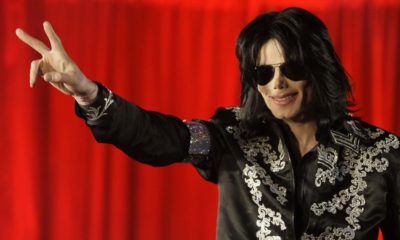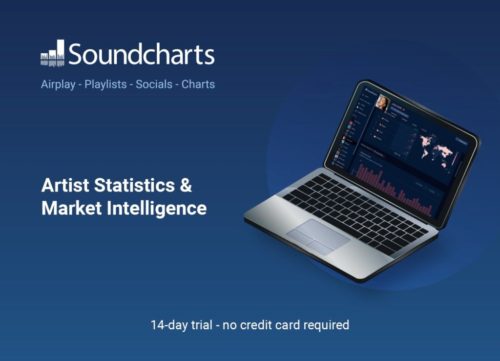Entertainment
2021 Grammy Awards: Winners List
The 63rd annual Grammy Awards took place at LA’s Convention Center, with no live audience. Beyoncé now holds the record for the most Grammy wins by any singer and any female artist in history.
Published
3 years agoon

Story Highlights
- The 63rd annual award show took place at LA’s Convention Center, with no live audience
- Beyoncé now holds the record for the most Grammy wins by any singer and any female artist in history
After postponing the event from January 31st to March 14th due to COVID-19, the 63rd Annual Grammy Awards took place this past Sunday night. Telecasting live from Downtown Los Angeles on CBS, the event mostly took place outdoors at the LA Convention Center, allowing them to use the Staples Center (the GRAMMYs’ usual venue) as a visual backdrop. Despite there being no live audience and viewership hitting a record-low, the night still ended up being historical on a number of levels.
The most nominated artist of the night was Beyoncé Knowles-Carter, who also ended up scooping the most awards – winning four of her nine nominations. This feat puts Beyoncé top of the list for the most Grammy wins by any singer in history, with a total of 28. She is now only beaten by Hungarian-British Conductor Georg Solti who won 31 during his career – and has tied with Quincy Jones, who also has 28.
View a list of winners and nominees below.
RECORD OF THE YEAR
- “Everything I Wanted” — Billie Eilish — Winner
- “Black Parade” — Beyoncé
- “Colors” — Black Pumas
- “Rockstar” — DaBaby featuring Roddy Ricch
- “Say So” — Doja Cat
- “Don’t Start Now” — Dua Lipa
- “Circles” — Post Malone
- “Savage” — Megan Thee Stallion featuring Beyoncé
ALBUM OF THE YEAR
- “Folklore” — Taylor Swift — Winner
- “Chilombo” — Jhené Aiko
- “Black Pumas” (Deluxe Edition) — Black Pumas
- “Everyday Life” — Coldplay
- “Djesse Vol. 3” — Jacob Collier
- “Women in Music Pt. III” — Haim
- “Future Nostalgia” — Dua Lipa
- “Hollywood’s Bleeding” — Post Malone
SONG OF THE YEAR
- “I Can’t Breathe” — H.E.R. — Winner
- “Black Parade” — Beyoncé
- “The Box” — Roddy Ricch
- “Cardigan” — Taylor Swift
- “Circles” — Post Malone
- “Don’t Start Now” — Dua Lipa
- “Everything I Wanted” — Billie Eilish
- “If the World Was Ending” — JP Saxe featuring Julia Michaels
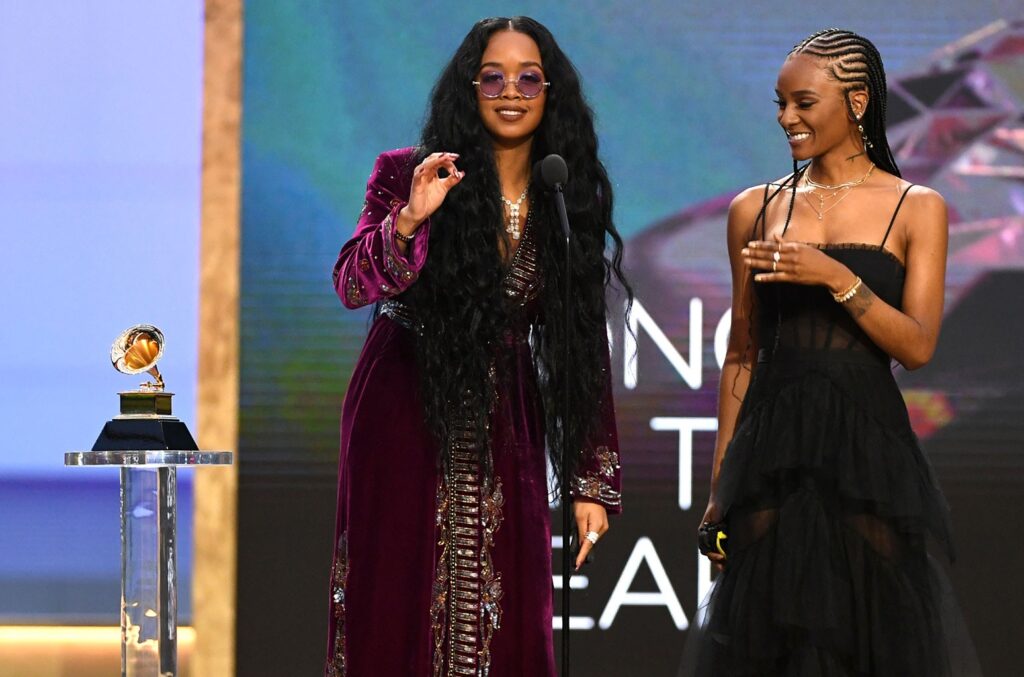
BEST NEW ARTIST
- Megan Thee Stallion — Winner
- Ingrid Andress
- Phoebe Bridgers
- Noah Cyrus
- Chika
- D Smoke
- Doja Cat
- Kaytranada
BEST POP SOLO PERFORMANCE
- “Watermelon Sugar” — Harry Styles — Winner
- “Yummy” — Justin Bieber
- “Say So” — Doja Cat
- “Everything I Wanted” — Billie Eilish
- “Don’t Start Now” — Dua Lipa
- “Cardigan” — Taylor Swift
BEST POP VOCAL ALBUM
- “Future Nostalgia” — Dua Lipa — Winner
- “Changes” — Justin Bieber
- “Chromatica” — Lady Gaga
- “Fine Line” — Harry Styles
- “Folklore” — Taylor Swift
BEST POP/DUO GROUP PERFORMANCE
- “Rain on Me” — Lady Gaga & Ariana Grande — Winner
- “Un Dia (One Day)” — J Balvin, Dua Lipa, Bad Bunny & Tainy
- “Intentions” — Justin Bieber featuring Quavo
- “Dynamite” — BTS
- “Exile” — Taylor Swift featuring Bon Iver
BEST TRADITIONAL POP VOCAL ALBUM
- “American Standard” — James Taylor — Winner
- “Blue Umbrella” — Burt Bacharach & Daniel Tashian
- “True Love: A Celebration of Cole Porter” — Harry Connick Jr.
- “Unfollow the Rules” — Rufus Wainwright
- “Judy” — Renée Zellweger
BEST R&B PERFORMANCE
- “Black Parade” — Beyoncé — Winner
- “Lightning & Thunder” — Jhené Aiko featuring John Legend
- “All I Need” — Jacob Collier featuring Mahalia & Ty Dolla $ign
- “Goat Head” — Brittany Howard
- “See Me” — Emily King
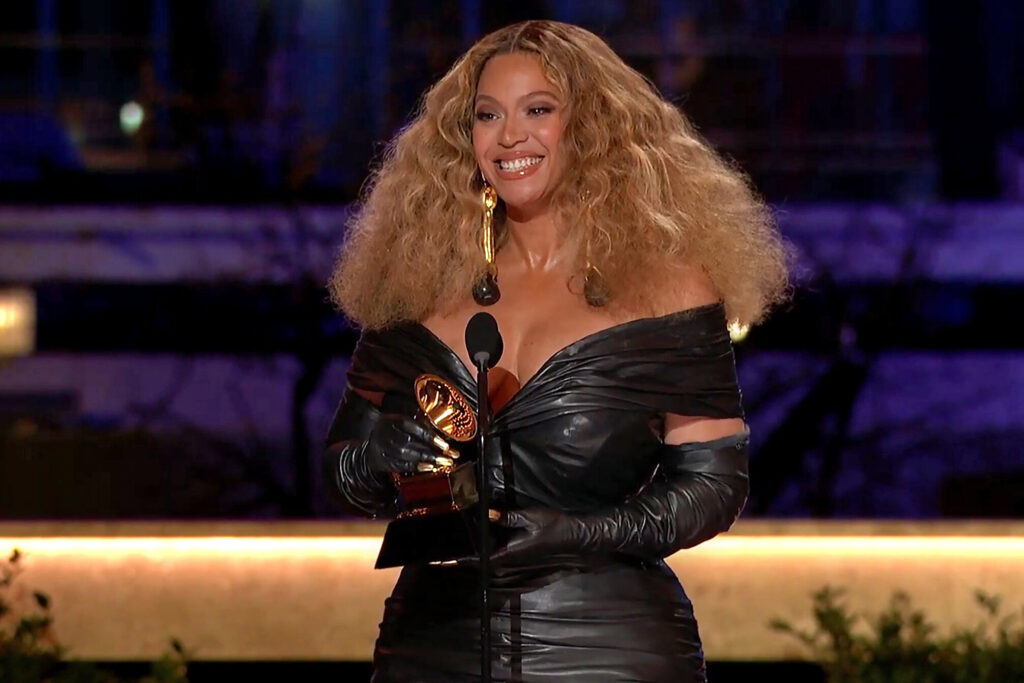
BEST TRADITIONAL R&B PERFORMANCE
- “Anything for You” — Ledisi — Winner
- “Sit On Down” — The Baylor Project featuring Jean Baylor & Marcus Baylor
- “Wonder What She Thinks of Me” — Chloe x Halle
- “Let Me Go” — Mykal Kilgore
- “Distance” — Yebba
BEST R&B SONG
- “Better Than I Imagined” — Robert Glasper featuring H.E.R. & Meshell Ndegeocello — Winner
- “Black Parade” — Beyoncé
- “Collide” — Tiana Major9 & EARTHGANG
- “Do It” — Chloe x Halle
- “Slow Down” — Skip Marley & H.E.R.
BEST R&B ALBUM
- “Bigger Love” — John Legend — Winner
- “Happy 2 Be Here” — Ant Clemons
- “Take Time” — Giveon
- “To Feel Love/D” — Luke James
- “All Rise” — Gregory Porter
BEST RAP PERFORMANCE
- “Savage” — Megan thee Stallion featuring Beyoncé — Winner
- “Deep Reverence” — Big Sean featuring Nipsey Hussle
- “Bop” — DaBaby
- “Whats Poppin” — Jack Harlow
- “The Bigger Picture” — Lil Baby
- “Dior” — Pop Smoke
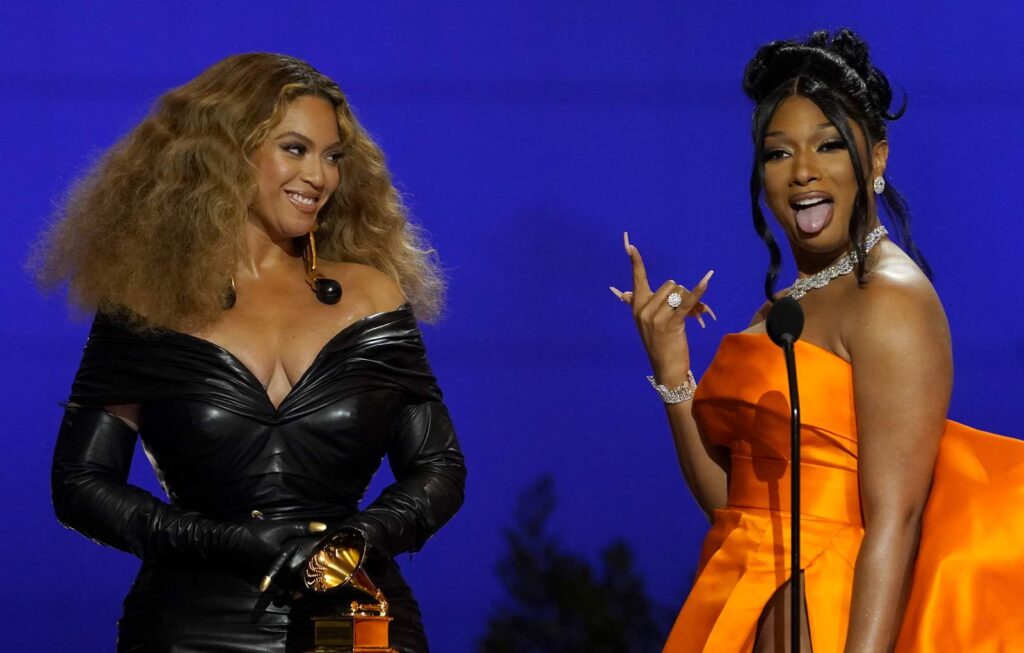
BEST MELODIC RAP PERFORMANCE
- “Lockdown” — Anderson .Paak — Winner
- “Rockstar” — DaBaby featuring Roddy Ricch
- “Laugh Now Cry Later” — Drake featuring Lil Durk
- “The Box” — Roddy Ricch
- “Highest in the Room” — Travis Scott
BEST RAP SONG
- “Savage” — Megan thee Stallion featuring Beyoncé — Winner
- “The Bigger Picture” — Lil Baby
- “The Box” — Roddy Ricch
- “Laugh Now Cry Later” — Drake featuring Lil Durk
- “Rockstar” — DaBaby featuring Roddy Ricch
BEST RAP ALBUM
- “King’s Disease” — Nas — Winner
- “Black Habits” — D Smoke
- “Alfredo” — Freddie Gibbs & The Alchemist
- “A Written Testimony” — Jay Electronica
- “The Allegory” — Royce da 5’9″
BEST LATIN POP OR URBAN ALBUM
- “YHLQMDLG” — Bad Bunny — Winner
- “Por Primera Vez” — Camilo
- “Mesa Para Dos” — Kany García
- “Pausa” — Ricky Martin
- “3:33” — Debi Nova
BEST LATIN POP OR URBAN ALBUM
- “YHLQMDLG” — Bad Bunny — Winner
- “Por Primera Vez” — Camilo
- “Mesa Para Dos” — Kany García
- “Pausa” — Ricky Martin
- “3:33” — Debi Nova
BEST REGGAE ALBUM
- “Got to Be Tough” — Toots & The Maytals — Winner
- “Upside Down 2020” — Buju Banton
- “Higher Place” — Skip Marley
- “It All Comes Black to Love” — Maxi Priest
- “One World” — The Wailers
BEST GLOBAL MUSIC ALBUM
- “Twice as Tall” — Burna Boy — Winner
- “Fu Chronicles” — Antibalas
- “Agora” — Bebel Gilberto
- “Love Letters” — Anoushka Shankar
- “Amadjar” — Tinariwen
For a full list of this year’s winners and nominees, click here.
Get weekly music biz updates straight to your inbox.

MBN Staff
Analysis
Canada Slashes Kendrick Lamar’s Radio Play By 25%, While Drake Sees a 10% Decline In The U.S.
MBN Exclusive: New Soundcharts Data Shows The Cogs Working Behind Rap’s Hottest War.
Published
2 months agoon
Thursday, 6 June 2024 @ 20:51 EDT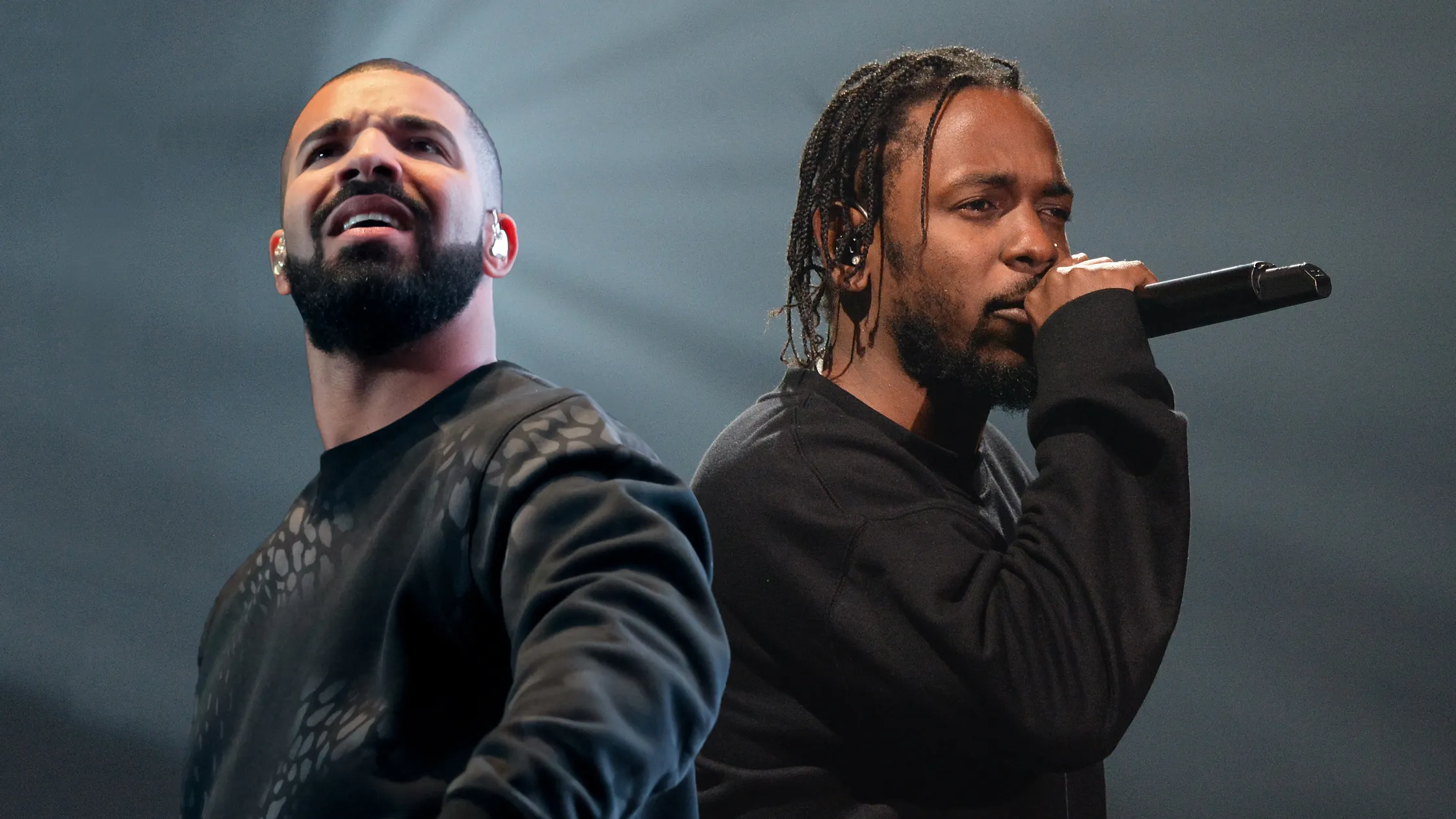
Story Highlights
New data provides unprecedented insight into the underlying methodology of the Drake-Kendrick feud crucial to understanding the broader battle for hip-hop supremacy.
Few rivalries in the high-stakes world of hip hop superstardom have captured the cultural zeitgeist as completely as the recent feud between ‘Rap Gods’ Drake and Kendrick Lamar. Being two of the genre’s OGs, their every move sent reverberations through the music industry and beyond. A lot of the conversation around the ‘slugfest’ revolved around the surface-level spectacle of the diss tracks and opinions among fans, but the real narrative that shapes this feud is the one presented in the data (the streaming numbers, radio spins and listener trends that provide an insight into the way the two superstars’ strategies prior to the ‘war of words’ helped them to navigate this war behind the scenes.
A Geographic Dividend
As we previously reported at Music Biz Nation, data from Luminate – a premier music analytics company – showed an slight difference in how Drake and Kendrick diss tracks were being consumed regionally versus internationally in comparison to their overall catalogs. In Kendrick’s case, American listeners were responsible for 62.2% of streams on his Drake diss tracks, 11.5% above his typical 50.7% U.S. share. Meanwhile, Drake saw only a small boost in U.S. streams for his Kendrick disses, bumping from 58.9% to 60.1% – with the remainder coming from international markets.
Getting more specific, Kendrick’s top listenership on Spotify stems from Los Angeles (also his top radio market), London and Chicago (all seeing a 2-3% monthly increase in the past month). Drake still comfortably maintained an 82.5 million to Kendrick’s 78 million in Spotify monthly listeners over the past 28 days, with his top markets on the platform being London, Los Angeles, and New York. Notably, Drake saw a 1-2% dip in listenership in all three of his top markets, while Kendrick gained ground in each of them.
The Streaming Showdown: Loyalty vs. Virality
In the wake of Kendrick’s numerous diss tracks, including the most popular of them all “Not Like Us,” (amassing 280 million streams and 2,000+ playlist placements on Spotify alone) his monthly Spotify listener count surged by an impressive 27 million. Drake, meanwhile, saw a comparatively modest dip of 1.5 million monthly listeners since the start of the feud, with his most popular Kendrick-diss “Family Matters” totaling a mere 66 million Spotify streams and 700 playlists on the platform. On the surface, this might suggest a clear win for Kendrick. However, a deeper dive into listener retention rates tells a more complex story.
Drake’s retention rate actually increased from 105% to 109% during this period, indicating that his core fanbase remains remarkably steadfast in their loyalty, even in the face of Kendrick’s onslaught. Additionally, Drake’s monthly listener count on Spotify, even after a 1.5 million dip, still towers over Kendrick’s but only slightly at 82.5 million to 78 million – a much closer gap than before the ‘war’.
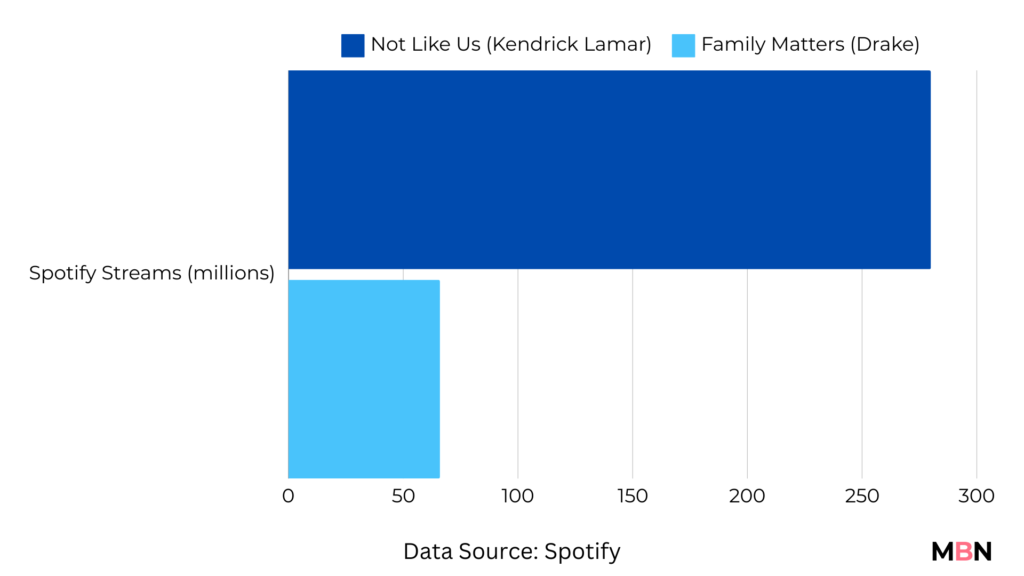
Kendrick, on the other hand, saw his retention rate plummet from 43% to 38%, suggesting that many of his newly-gained listeners may be more curious onlookers than devoted fans.
This data paints a picture of two contrasting strategies – one focused on cultivating deep, lasting loyalty, the other on generating viral moments and sparking widespread curiosity. While Kendrick’s approach may be winning the battle for short-term attention, Drake’s strategy could prove more effective in the long-term war for enduring dominance.
Kendrick’s cultural references in his diss tracks is likely what ignited and engaged more of his U.S. audience. Meanwhile, the strength of his overall catalog has allowed Drake to rely on his status as a global superstar, betting on the continued reliability of his massive global audience to absorb any blowback.
Radio Waves Shift: Kendrick's Domestic Surge
Soundcharts data also point to a change in radio play dynamics over the last month. While Drake’s radio spins dipped slightly in the U.S. (-9%) and U.K. (-6%) – two of his top markets – Kendrick Lamar has seen an 80% increase in U.S. radio play in the wake of feud. Lamar’s increased radio play in the U.S. was, unsurprisingly, driven by airplay of “Not Like Us” in the Los Angeles area (his home county) on stations such as Power106 and KRRL-FM Real 92.3 (responsible for Kendrick’s highest number of global radio plays over the last month).
Most tellingly, but somewhat expected, the LA-based Real 92.3, the station that has been Kendrick’s staunchest cheerleader, cut Drake’s airplay by a staggering 30% during the month of May.
This domestic dominant radio surge for Kendrick, coupled with the increase in U.S. streaming share for his diss tracks might speak to the effectiveness of his regionally-focused strategy in comparison to Drake’s. And with the U.S. being the biggest market for the Hip Hop genre, it is not difficult to see why a strategy like this has created such an impact in his battle with the Toronto-based rapper.
In Drake’s case, despite facing slight challenges in the U.S. radio market during the feud, the ‘6 God’ has managed to maintain his global radio dominance by making up ground key local and international markets in regions such as France (up 12%) and his home country of Canada (up 8%), where Kendrick has seen a 25% decline in airplay.
In saying that, like Drake, Kendrick has also compensated by making significant progress in other international radio markets over the past month – such as Nigeria (+104% in spins) and portions of Europe (U.K. +40%, Belgium +27%, Germany +26%, ).
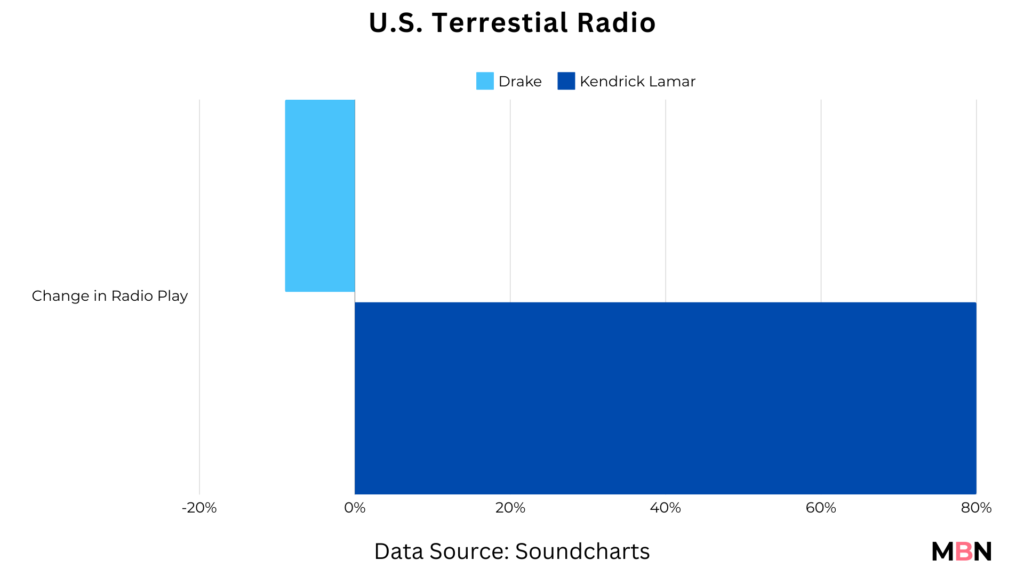
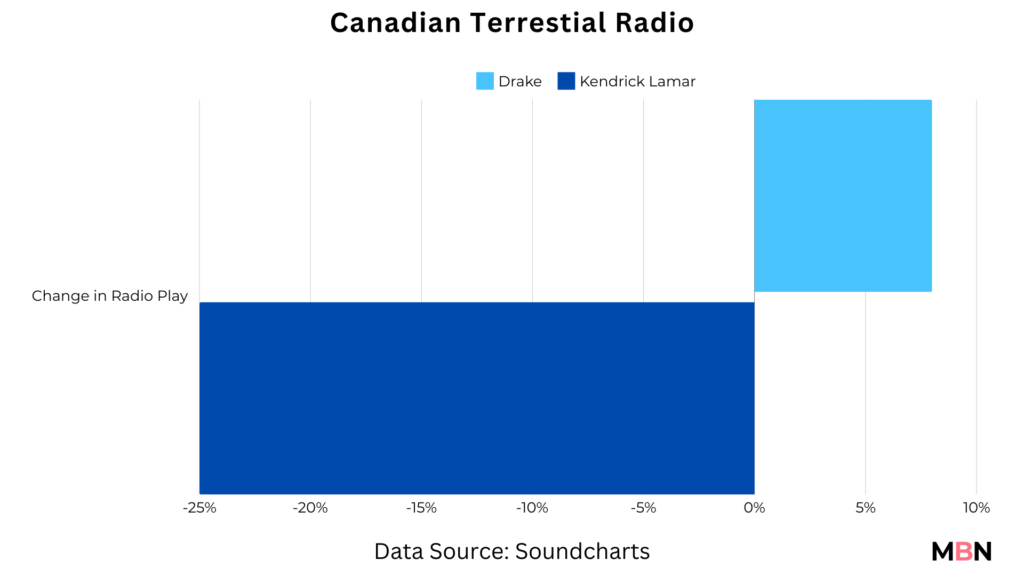
Kendrick's Viral Breakthrough: The TikTok Wildcard
Where Drake may be ahead in terms of the raw numbers of streams and spins of his overall catalog, when it comes to the virality of this feud, Kendrick has taken the crown by more than a mile.
In just one month after its release, “Not Like Us” was the soundtrack for 560,000+ TikTok videos and 1.4 billion views, quickly becoming his third most popular song on the platform as lead artist (surpassing “We Cry Together”, from his most recent album ‘Mr. Morale & The Big Steppers’). The uptick is arguably a testament to Kendrick’s ‘hidden’ ability to create a moment that lands with TikTok’s wide audience often moved by the winds of popularity – something Drake was more known for excelling at prior to the feud. Drizzy’s most popular TikTok song “Tootsie Slide” has amassed 2.8 million videos and 8.2 billion views, compared to Kendrick’s 1.1 million videos and 1.3 billion videos for his most popular TikTok song “HUMBLE”. Notably, “Not Like Us” has accumulated more TikTok views than “HUMBLE.” with half the number of videos, speaking to its undeniable cultural impact.
Drake’s most popular song in the ‘back and forth’ with Lamar, “Family Matters”, stands at just 1,800 TikTok videos and 7.5 million views.
In an era where a single viral moment can redefine an artist’s trajectory, Kendrick’s overwhelming TikTok triumph in this feud could be an extremely powerful weapon in his arsenal. If he can sustain this momentum and translate the buzz into lasting listener growth and engagement, it could dramatically redefine of his overall positioning. Should the feud continue in any way, this is a wildcard that Drake (despite his overall dominance) cannot afford to ignore.
Looking Ahead...
With all that said, one thing is clear: the Drake-Kendrick beef was much more than a rap beef. As the reams of data show, it’s a rich, multifaceted playbook for how different strategies can determine equally impactful yet completely different outcomes. Every artist has their own unique arsenal of strengths and strategies — Drake’s unbreakable global grip and resistance to wobble in the storm, Kendrick’s gift for the viral moment and local relevance — which we’ll continue to watch with his future releases.
Get weekly music biz updates straight to your inbox.

MBN Staff
Entertainment
Sony Reportedly in Talks for $1 Billion Queen Catalog Acquisition
Source says discussions between Queen and Sony Music over the British band’s catalog sale have been ongoing since last year.
Published
2 months agoon
Thursday, 30 May 2024 @ 13:46 EDT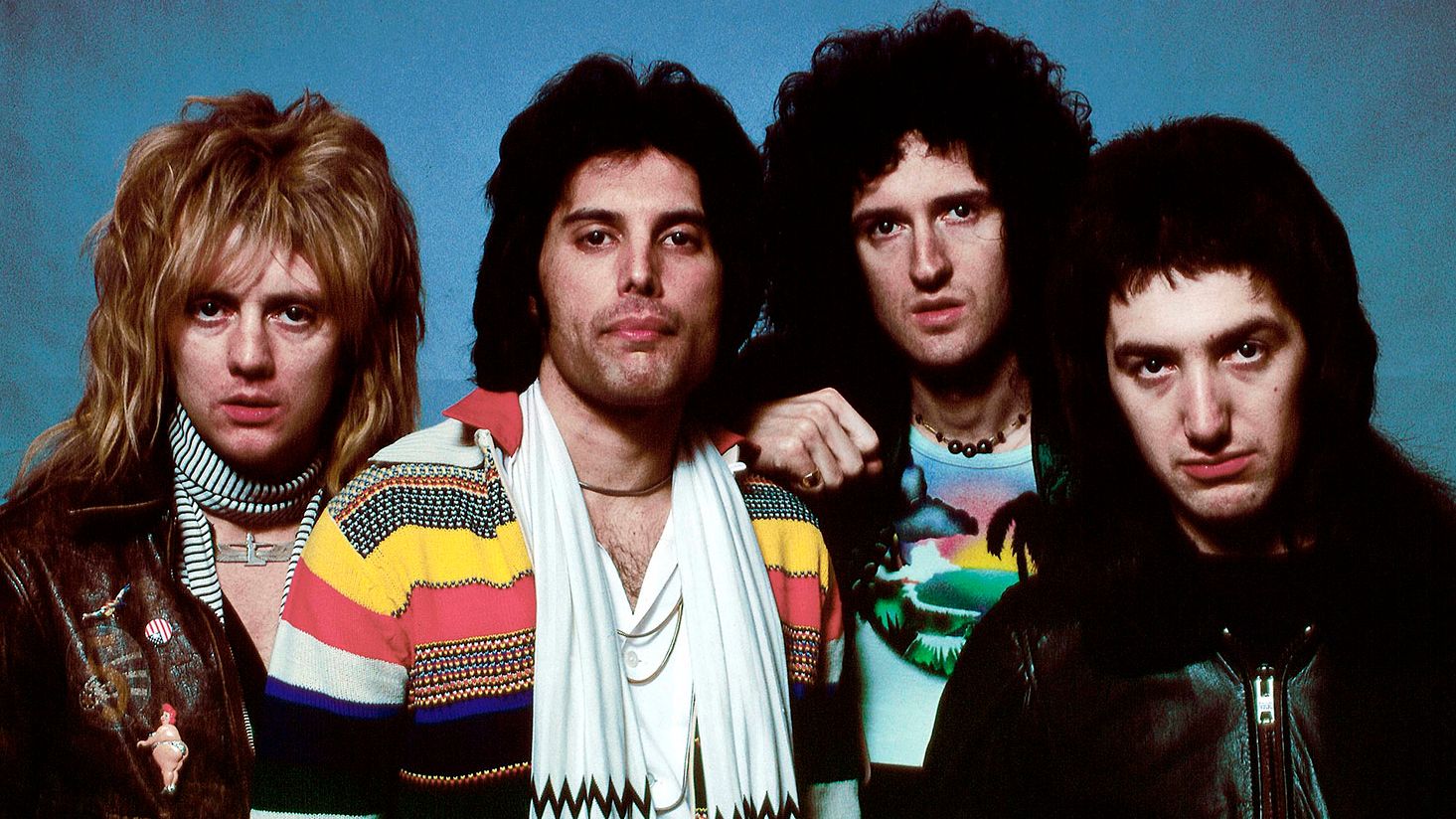
Story Highlights
Sony’s potential deal for Queen’s music assets could make it the biggest single-artist catalog acquisition in history.
According to multiple outlets, sources report that iconic British rock band Queen has been seeking a valuation of around $1.2 billion for its music assets, which consist of both publishing and master recording rights jointly owned by the band’s surviving members Brian May, Roger Taylor and John Deacon, as well as the Freddie Mercury estate. Bloomberg first reported that Sony Music is the undisclosed suitor currently in an exclusive negotiating window with Queen, working with an unnamed financial partner.
Music Business Worldwide originally broke news of the catalog being shopped for a 9-figure sum in May 2023, noting that major labels like Universal Music Group and private equity players had engaged in discussions.
Of course, putting together a deal of this magnitude and complexity, especially with multiple stakeholders involved, comes with no guarantee of closer. As a cautionary example, sources say Pink Floyd’s attempt to sell their catalog for $500 million collapsed in 2022 due to band members having differing priorities.
Inside Queen's Financial Performance
Music Business Worldwide also reported that Queen Productions Ltd, the UK entity housing the band’s recordings, reported £40.89 million ($50.41m) in turnover for the fiscal year ending September 2022, a 4.3% increase over 2021. Profit before taxes jumped 31.6% to £22.16 million ($27.41m).
Much of this growth likely stems from the popularity boost following the band’s 2018 biopic Bohemian Rhapsody. In fact, the FY2022 revenue figure more than tripled Queen’s £12.34 million turnover ($16.72m) in FY2016 before the film’s release. The band’s enduring appeal is further evidenced by the nearly 38 million album consumption units and 46 billion on-demand global streams their catalog has amassed since 1991, according to Luminate and reported by Billboard.
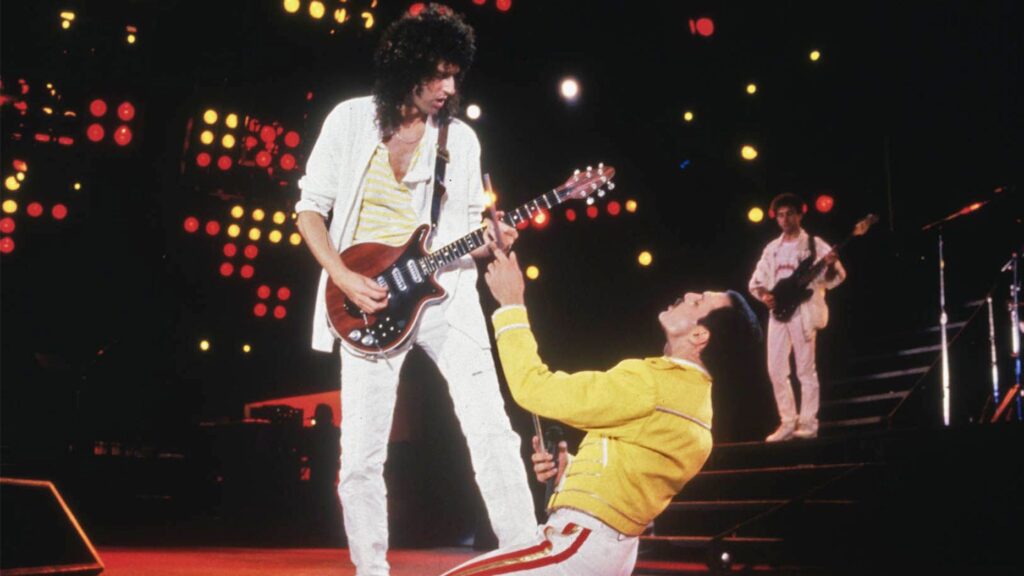
Implications of a Billion-Dollar Sale
If completed in the $1 billion range as reported, Queen’s sale would handily surpass Bruce Springsteen’s $500 million+ catalog deal with Sony in 2021 to become the biggest transaction for a single artist’s body of work. It would also dwarf the $600 million Sony allegedly paid in February for 50% of Michael Jackson’s catalog. Though, technically speaking, with only the remaining 50% sold, the deal with the Jackson estate valued the late King of Pop’s catalog at $1.2 billion – slightly above than the reported $1 billion offer of Queen’s work, if that number is exact.
However, Queen’s situation is a little more complicated due to Disney Music Group’s current rights to their master recordings in North America under the Hollywood Records umbrella. Any acquirer would need to navigate that structure and DMG’s global distribution pact with Universal.
The stratospheric valuations attached to evergreen hit songs have enticed artists to cash in on their life’s work, accepting a one-time capital gains tax rather than annual income taxes on royalties. But as the Hipgnosis Songs Fund has demonstrated, aggregating catalogs at premium prices fueled by cheap debt doesn’t automatically translate into strong returns. Blackstone’s takeover of Hipgnosis following a shareholder revolt underscores the potential risks of catalog acquisition sprees.
Queen, though, stands apart as one of the most commercially successful acts in history, notching six No. 1 singles and 10 No. 1 albums in the UK across five decades. With the right promotion and synch opportunities, dozens of their songs like “Bohemian Rhapsody,” “We Will Rock You,” and “Another One Bites the Dust” have the potential to generate substantial returns for decades to come. But at a $1 billion entry price, Sony or any other buyer will need to be confident they can unlock significantly more value to make the numbers work.
Get weekly music biz updates straight to your inbox.

MBN Staff

Canada Slashes Kendrick Lamar’s Radio Play By 25%, While Drake Sees a 10% Decline In The U.S.

Sony Reportedly in Talks for $1 Billion Queen Catalog Acquisition

Drake vs. Kendrick: How Their Diss Track Data Reveals Divergent Paths to Streaming Dominance

Albums Chart Data: Swift & Eilish Dominate UK & US Listings









